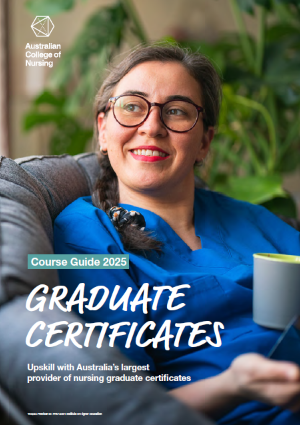On this page: Overview | Course rationale | Learning outcomes | Course structure | Entry requirements | Document requirements | Clinical placements | Fees | Apply
Career break? Re-enter nursing with confidence
The Graduate Certificate in Re-entry is designed to meet the requirements of the NMBA and the Australian Nursing and Midwifery Accreditation Council (ANMAC) EPIQ and Re-Entry Registered Nurse Accreditation Standards (2014) through assessment. The Standards for Practice articulate the core competencies used to assess the performance of nurses wanting to retain registration to practice as a registered nurse in Australia. The Standards for Practice are also used by higher education providers when developing nursing curricula and assessing student performance. The course is designed to facilitate the registered nurse to build upon previously acquired knowledge and skills from the bachelor of nursing degree completed.
Please note the Bridging pathway for internationally qualified nurses is no longer available.
Important dates
2025 cohorts
| COHORT | UNIT 304 INTAKE DATE | UNIT 304 CENSUS DATE | UNIT 305 INTAKE DATE | UNIT 305 CENSUS DATE | COMPLETION DATE |
|---|---|---|---|---|---|
| 221 | 3 February 2025 | 17 February 2025 | 3 March 2025 | 17 March 2025 | 25 April 2025 |
| 222 | 5 May 2025 | 19 May 2025 | 2 June 2025 | 16 June 2025 | 25 July 2025 |
| 223 | 15 September 2025 | 29 September 2025 | 13 October 2025 | 27 October 2025 | 5 December 2025 |
Course rationale
To meet the industry needs of the Australian healthcare system, nurses are referred by the (NMBA). Under section 53(b) of the Health Practitioner Regulation National Law (the National Law) an individual must hold a qualification the National Board established for the health profession considers to be substantially equivalent, or based on similar competencies, to an approved qualification. Where the NMBA have assessed the qualification of a nurse that does not meet this criterion, the Nursing and Midwifery Board of Australia (NMBA) may under Section 53(c) require the individual to successfully complete an examination or other assessment required by the NMBA for the purpose of general registration.
The Graduate Certificate in Re-Entry is designed to meet the requirements of the NMBA and the Australian Nursing and Midwifery Accreditation Council (ANMAC) Re-Entry Registered Nurse Accreditation Standards (2014) through assessment.
Learning outcomes
Upon successful completion of the course, students should be able to:
- Critically evaluate nursing practice against the NMBA Registered Nurse Standards for Practice
- Demonstrate capability for practice within an evidence-based framework
- Evaluate delivery of care across the lifespan in the context of the contemporary Australian healthcare system
- Analyse effective communication within a multicultural and multidisciplinary approach to safe practice
- Critically reflects upon legal and ethical standards that underpin professional nursing practice
- Examine leadership behaviour that contributes to effective team culture
Course structure
This course is a comprehensive, contemporary, and clinically relevant Graduate Certificate in Nursing and runs for a total of 12 weeks full-time study. Delivery of the course consists of face-to-face, simulation, and self-directed learning, online activities, and clinical placement components.
Our course consists of two (2) core units of study:
304 Unit overview
The purpose of this unit of study is to explore the professional role of registered nurses in the Australian healthcare context. Students will gain an understanding of safe, appropriate, and responsive nursing practice within this context and examine the role of quality, research, evidence-based practice and the professional development of self and others. Students will enhance their clinical skills through an analysis of best practice principles to help them better manage the care of people and develop their clinical decision-making ability. This unit includes the following themes:
- Theme 1 – Nursing practice in the Australian healthcare context
- Theme 2 – Social determinants of health and wellbeing
- Theme 3 – Professional culture and behaviour in the Australian healthcare context
- Theme 4 – Cultural safety
- Theme 5 – Principles of patient safety and better health outcomes
- Theme 6 – Research and inquiry
| EFTSL | Credit points | Hours of study |
| 0.25 | 12 | 300 |
304 Assessments
These unit of study is delivered at a postgraduate level, AQF level 8. Students are required to demonstrate advanced knowledge and skills, both at an academic level and in clinical practice.
The assessments for Unit 304 are:
| Assessment | Weighting | Formative (F) Summative (S) | Week assessed |
|---|---|---|---|
| Contribution to online discussions | 5% | F | 2 and 5 |
| Objective structured clinical assessments Must achieve 100%, 3 attempts given | 10% | F | 3 and 4 |
| Medication exam Must achieve 100%, 3 attempts given | 5% | S | 2 |
| Online multi-choice quizzes | 20% | F | 2 and 3 |
| PICO question and search strategy | 15% | F | 5 |
| Short answer essay | 25% | S | 4 |
| Reflective essay | 20% | S | 5 |
More information about the assessments is available in the Student Handbook which will be provided during orientation.
305 Unit overview
The purpose of this unit is for students to explore and apply professional nursing practice knowledge and skills in the clinical environment. The unit assesses the student’s clinical practice against the national standards of practice for the registered nurse as mandated by NMBA during supervised clinical placement. The unit allows the student to consolidate their experiential learning through clinical supervision and professional development. The clinical experience is divided into two (2) blocks each with a three (3) week duration and may be undertaken in both acute and aged care settings. This unit includes the following themes:
- Theme 1 – Critical thinking and analysis of nursing practice
- Theme 2 – Engagement in therapeutic and professional relationships
- Theme 3 – Capability of practice
- Theme 4 – Comprehensive patient assessment
- Theme 5 – Planning for nursing care
- Theme 6 – Providing safe, appropriate and responsive quality nursing practice
- Theme 7 – Evaluation of outcomes to inform nursing practice
| EFTSL | Credit points | Hours of study |
| 0.25 | 12 | 300 |
305 Assessments
The unit of study is delivered at a postgraduate level, AQF level 8. Students are required to demonstrate advanced knowledge and skills, both at an academic level and in clinical practice.
Assessments for Unit 305 will focus on the application of the learning components completed during Unit 304:
| Assessment | Weighting | Formative (F) Summative (S) | Week assessed |
|---|---|---|---|
| Guided case analysis | 25% | S | 8 |
| Professional Experience Placement (PEP) | 40% | S | 11 |
| Learning Contract | 35% | S | 12 |
More information about the assessments is available in the Student Handbook which will be provided during orientation.
Entry requirements
- hold a Bachelor of Nursing or equivalent
- be referred to this course by the Australian Health Practitioner Registration Agency (AHPRA)
- meet the Nursing and Midwifery Board of Australia English language skills registration standard (nursing and midwifery) – please refer to the AHPRA website to download the standard.
- fulfill the required immunity status as per NSW health guidelines
- provide a Unique Student Identifier
*People who have not practised as a nurse and are not registered but wish to return to practice must lodge an application with the Nurses and Midwives Board of Australia (the NMBA). The assessment of the application will determine whether the applicant will be required to complete an NMBA-approved re-entry to practice program. Please visit the NMBA website for full details.
For any enquiries about the course, please contact Ashley Page via email ashley.page@acn.edu.au.
Document requirements
Participants must provide originals or certified copies of the following documents:
- AHPRA referral letter (must be valid at course commencement)
- Valid visa (if applicable)
- Valid Australian police/criminal record check, please refer to these links for more information: AFP website, national crime check website or the AMICI Tech website
- Students who are not Australian citizens nor holding permanent resident status also need to provide a criminal record check from their country of origin and any other country they have resided in since the age of 16 or older in addition to their Australian criminal record check. This can be the same criminal record check as used for AHPRA (i.e. fit2work).
- Record of immunisation as per your residential state or territory
- Working With Children or Vulnerable People Check (as per your State requirement)
- All documented evidence of immunisations and original serology must be provided with the application:
- Diphtheria, pertussis and tetanus (dTpa, not ADT) within the last 10 years
- Varicella, either positive serology OR 1x vaccination if administered prior to age 14 OR 2x vaccinations at least 28 days apart if administered from 14 years old
- Mumps, measles and rubella, either positive serology OR 2x vaccinations at least 28 days apart OR a birth date prior to 1966
- Hepatitis B, positive serology AND evidence of age-appropriate vaccinations OR signed a statutory declaration upon course commencement
- The current year’s/season’s flu vaccine obtained in Australia ONLY
- COVID-19 vaccine (2 doses, NSW) for more details see here
Please note: You may be asked to undertake Tuberculosis screening after commencement of the course if requested by your GP or Clinical Placement Provider (IGRA Blood Test and Chest X-ray).
Clinical placements
Anyone applying for an ACN course that includes a clinical placement must provide evidence of compliance documents at the time of application.
Applications for enrolment will not be progressed until all relevant documentation has been received by ACN.
Individual placement providers may need additional documentation. If you are required to provide this then you will be contacted by the ACN Clinical Placement Officer following enrolment.
ACN negotiates with health care facilities to secure clinical placements. ACN will make every effort to ensure clinical placements are within the timeframe indicated in the course outline, however, applicants are advised that provision and location of clinical placements is dependent on the availability of placements within the health facility. Please note you may need to travel for placements.
Once placements are confirmed these cannot be negotiated unless there are unforeseen extenuating circumstances. Applicants are not to arrange their own clinical placements with a clinical facility under any circumstances.
ACN reserves the right to change clinical placements. Shifts may include morning, afternoon, and night duty.
View further information about clinical placements.
ACN is required under the National Law to comply with mandatory notification requirements. Please refer to the Nursing and Midwifery Board of Australia (NMBA) for full details.
Fees
2025 price: $17,072.50*
*The ACN Member discount cannot be applied for the Graduate Certificate in Nursing (Re-entry).
Fees are subject to change without notice.
ACN offers a flexible payment option allowing students to pay their fees on a term-by-term basis. Each term’s fees are due upfront, prior to term commencement.
FEE-HELP is also available for Australian citizens. Further information can be found here.
Meet your Nurse Educator

Tapuwa Sandra Ndhlela (Sandra), Nurse Educator – Higher Education
RN, MN (Advance practice), BN, Cert IV TAE, Critical Care Certificate
e: tapuwa.ndhlela@acn.edu.au
» About me
Sandra is an experienced registered nurse and holds a Master’s in Nursing Advance Practice from the University of Newcastle. Prior to joining the Australian College of Nursing, she worked as a clinical nurse specialist and nurse educator in busy acute settings, providing expert guidance and education to nursing staff. In additional to her clinical education experience, she has also been actively involved in the education of undergraduate students in the university setting. Sandra has a particular interest in responding to and managing clinical deterioration and supporting nursing staff in this important aspect of clinical care.
Sandra believes in fostering a culture of safety through collaborative patient care, continuous improvement, critical thinking and bridging the gap between theory and practice. Her passion is providing education that nurtures and guides other nurses to become well equipped expert practitioners.
» Collapse
Apply now
Intakes
| COHORT | UNIT 304 INTAKE DATE | UNIT 304 CENSUS DATE | UNIT 305 INTAKE DATE | UNIT 305 CENSUS DATE | COMPLETION DATE |
|---|---|---|---|---|---|
| 221 | 3 February 2025 | 17 February 2025 | 3 March 2025 | 17 March 2025 | 25 April 2025 |
| 222 | 5 May 2025 | 19 May 2025 | 2 June 2025 | 16 June 2025 | 25 July 2025 |
| 223 | 15 September 2025 | 29 September 2025 | 13 October 2025 | 27 October 2025 | 5 December 2025 |
Please ensure you read all course information and make sure you meet entry requirements prior to commencing the application form.
Applications for enrolment will not be progressed until all relevant documentation has been received by Customer Services.
We strongly encourage applications from Aboriginal and Torres Strait Islander health care professionals to study this course. If you are an Aboriginal or Torres Strait Islander person we encourage you to let us know in your application. If you require assistance with completing your application or support during the course, please don’t hesitate to let us know.
Application form will open in a new window. Your privacy is very important to us. To better serve you, the form information you enter is recorded in real time.
Graduate Certificate attributes
Get valuable industry skills with a competitive edge. ACN supports our students to graduate with the following attributes:
1
Demonstrate enhanced professional, social and ethical understanding in a specialist area of practice.
2
Apply complex problem solving and information literacy skills to the development of evidence-based practice, research and policy reform.
3
Engage in behaviour that is culturally appropriate, safe and sensitive to the needs of people in their care.
4
Demonstrate an understanding of, and respect for, Australian Aboriginal values, culture and knowledge to build trust and improve health outcomes.
5
Combine advanced communication skills with an awareness of global health determinants to independently and collaboratively lead and educate others.
6
Reflect and think critically to be better able to care for self, improve health outcomes, and influence safe and effective professional practice.
Virtual Open Day
Jump online for Virtual Open Day to learn more about studying with the Australian College of Nursing (ACN).
Whether you are a nurse ready to upskill with a specialty graduate certificate or immunisation course, seeking an entry pathway to Masters or want to explore continuing professional development opportunities, this interactive event will answer all your questions.
Connect directly with experienced nurse educators and academics and discuss your career goals. Learn about how postgraduate study can shape your career, gain tips and tricks on preparing for online study and student life, all from the comfort of your own home.

Discover more course options from ACN
We’re here to help you every step of the way

For general information please contact:
Customer Services
t: (02) 9745 7500
e: customerservices@acn.edu.au
More information
General information
Important dates
Clinical placements
Postnominals
Frequently asked questions
- A Graduate Certificate typically requires the completion of 4 units (equivalent to 6 months of full-time study) or 24 credit points.
- A Graduate Diploma generally involves 8 units (equivalent to 1 year of full-time study) or 48 credit points.
- A Graduate Certificate is an entry-level postgraduate qualification, offering foundational knowledge in a specific area. It's often used for career advancement, upskilling, or transitioning to a new field. It is ideal for those seeking to enhance specific skills or qualifications without committing to a longer program. While a Graduate Diploma builds on the foundational knowledge of a Graduate Certificate, providing a deeper understanding and more advanced skills in the subject area.
- A Graduate Diploma is more expensive than a Graduate Certificate because it involves completing twice the number of units.
Each unit is worth 6 credit points, with a total of 24 credit points for the course.
You need to complete four units to obtain a Graduate Certificate.
A Graduate Certificate includes four units. The total cost depends on the Tier levels of the units. For example, a course with three Tier 1 units and one Tier 2 unit in 2025 will cost $10,680. Members receive a 10% discount on course fees.
Learn more about membership, its benefits and how to join.
Each unit has a different cost, indicated by its Tier level. You can find the specific fee amounts for each Tier level in the fee schedule.
Once you have receive the offer letter and accepted the place, you will receive the invoice for the unit fees. You can pay via bank transfer (details provided in the invoice) or by calling (02) 9745 7500 during business hours (8:30 am – 5:00 pm) to pay over the phone.
No, Commonwealth Supported Places are not offered for Graduate Certificate courses. However, FEE-HELP is available for eligible applicants. To see if you are eligible for FEE-HELP, please go the Australian government Study Assist website.
No, Graduate Certificate courses and single units of study have fixed start dates. There are four terms per year: January, April, July, and October. Check the Important Dates section on the website for details.
The course is typically completed in one year (one unit per term. If you would like to take leave during your study, you can take up to three consecutive terms of leave if you have enrolled in at least one unit. However, you must finish the course within two years.
No, there are no exams. The course and assessments are delivered online. Please note some courses may require mandatory in-class attendance or (off-site) clinical placements. For more details, please see individual course pages.
No, once you are enrolled in the course, you can access the online learning platform anytime to access the course material, offering flexibility for students balancing work and family commitments. However, assessments are only available during specific periods and must be completed within the allocated timeframe. The online course is supported by course coordinators, unit coordinators, tutors, and library staff, who offer access to resources such as books, journals, and databases.
Note: The Graduate Certificate in Nursing (Re-entry) is an exception and has both mandatory on-campus classes as well as clinical placements.








